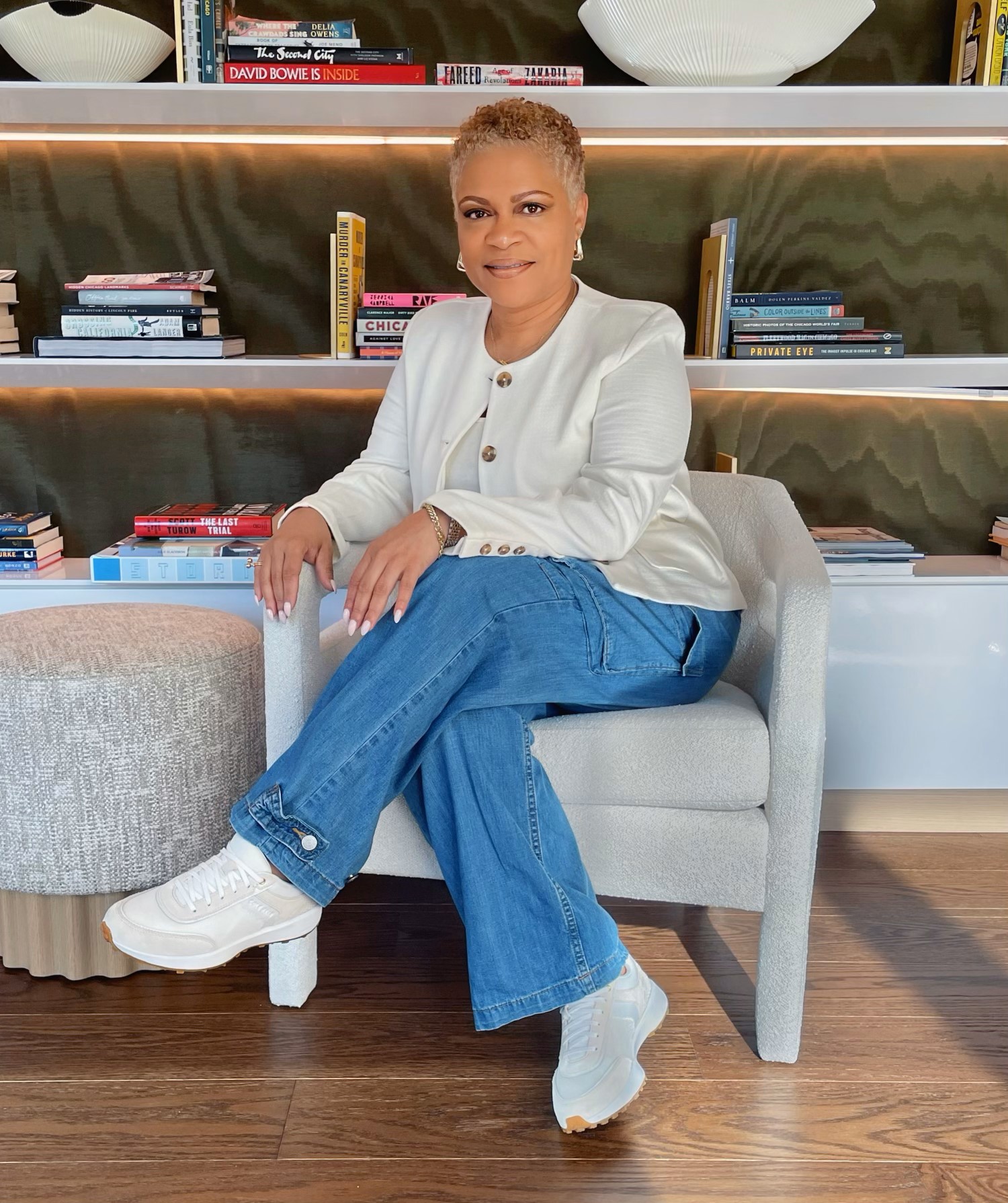
Lucy Brazier interviewed Tara Sims for our recent ES Global online conference. The full interview is available as an adminchat on our YouTube channel, and we have included the highlights from the interview here.
Tara M. Sims is a dynamic leader and accomplished Regional Administrative Manager at a leading global real estate management firm. As the founder, owner, and CEO of Evolved Assistant, a Virtual Assistant agency, and author of the book Evolved Assistant: Unlocking Success in a New Era for Administrative Professionals, Tara is recognised as an authority in administrative excellence. A New Orleans native now based in Atlanta, she has over two decades of experience supporting C-suite leaders and senior executives.
Her journey, which began after earning a BA in Psychology from Denison University, is marked by a relentless passion for enhancing the impact of administrative professionals. Known for her adaptability, problem-solving skills, and ability to build strong executive partnerships, Tara excels in guiding teams to deliver exceptional results.
Her leadership style is deeply people-focused and partnership-oriented, combining her expertise in executive support, organisational strategy, and coaching to foster successful collaborations between executives and their administrative teams. Her insights have made her a sought-after speaker and thought leader, with features on The Leader Assistant Podcast, The EA Campus Podcast, World 50 Executive Administration Program, and other platforms. In 2021, she was honoured with the Admin Awards Leadership Award, a testament to her influence and contributions to the profession.
Tara’s passion for elevating the role of administrative professionals is evident in her work, her writing, and her speaking engagements, where she inspires others to unlock their full potential and drive organisational success.
Lucy: What inspired you to write Evolved Assistant and how does it reflect your personal journey as an administrative professional?
Tara: I’ve spent 20 years in this profession, and I always like to share the fact that it’s a profession that I chose. I know a lot of people fall into it, but it really was one I chose because prior to it, I had an entirely different career for a decade. I am someone who cares deeply about the work that we do and those of us that do it. And so, throughout my career in the profession, I’ve spent a lot of time advocating for our community within the organisations that I’ve worked, encouraging Assistants to speak up, ask for things that they want or need, raise their hand. And I have never really been someone who feels like we should play small.
The book is a personal reflection, but it’s also an observation of others’ experiences and a professional call to action. It’s a message to all of us that we have the power to change our careers, to evolve in our careers on our own terms.
‘Career fulfilment or growth for leadership aren’t things that we have to wait to be given; we can claim those things ourselves.’
Lucy: Talk to me about your career. Was there a pivotal moment where you thought “This is where I can really see the need for evolution”?
Tara: The pandemic shook the foundation of how we worked. For me personally, it was twofold because it gave me time to sit still and really reflect not just on what I was doing, but on the role of what an Assistant had become and that many of us had built our identities around in-office logistics. The second layer of this was that whilst many people were working remotely, I was in the office the entire time and so I had a front row seat to how leadership was navigating uncertainty. I was also managing a team of Assistants who were now working from home and navigating their own fears and questions and challenges. It forced me to think differently. I had to be more strategic, more intentional.
I remember pulling together my team for a virtual brainstorming session and saying to them that we need to start talking about what we can do and how we can continue to add value when we’re no longer in the same spaces as the people we support.
The conversation was really transformative.
We advocated to be included in virtual meetings, which we had never been in before. We challenged ourselves to be more proactive, to look for opportunities, to take notes in the meetings and then follow up on those deliverables, to find gaps in things.
There were lots of new processes that were happening, such as virtual onboarding, which was something that had never been done before. And so we started expanding our tech skills, such as becoming experts in Teams. We were looking for ways to keep the corporate culture alive with virtual team events and so much more.
My goal in that moment was for us to think about turning this moment of disruption into an opportunity for reinvention. And I make that link in the book.
I talk about this idea that any change in our workplaces, in our environments, in the changing landscape of the business world, could provoke this need for us to evolve, and so we should see these events as opportunities and not as ways to shrink ourselves. Assistants who are really going to thrive and advance in the future are going to be the ones who are stepping forward when changes happen.
Lucy: I want to talk about your 4Ms framework, which I think is genius. I love it. Can you break down that 4Ms framework for us? Because I think it really helps to understand how an Assistant can grow.
Tara: The 4M framework is the heart of the book and was developed out of real-world lessons that I’ve learned over the two decades in the field. From where I sit, I feel like they are principles that sustain long-term growth. Starting with Mindset, we really focus on cultivating your attitude, your outlook, your mentality, your frame of mind. It’s crucial you approach your personal and professional transformation with the right mindset because it is the cornerstone for navigating the subsequent steps, laying the groundwork for future success.
Management is where we move into behaviour and adjusting behaviour. Now that you’ve gotten your mindset to a certain place, let’s talk about how you’re showing up in the work. Let’s talk about the quality of the work. Let’s look at your work habits, your methodologies, and this is where we refine and advance our skillset while also deepening our understanding of the individuals that we support.
The third is Marketing. Here is where you define your personal brand. You start to shape the narrative surrounding your role and how others perceive you. This one can sometimes be uncomfortable for many of us, but it is critical because we need to be able to articulate our value and advocate for our own development.
And then the final in the framework is Maintenance, and maintenance is where you integrate all the principles of the framework and put them into sustained practice. This is the time frame in which you start to witness the outcomes of your efforts towards your personal evolution.
Lucy: I want to dive a little bit deeper into Mindset. Talk to me about how an Assistant shifts. How do they make that shift from being reactive and task-based?
Tara: I think that shift starts with intentionally changing how you approach the role, how you think about your value, how you speak about your contributions, and how you engage with the business. For years we’ve been conditioned, whether directly or subtly, to believe that we exist only to assist others in achieving success, but not necessarily to achieve it for ourselves.
We take pride in being the glue, but often without asking for credit. There are a couple of things that I think it’s important for Assistants to really think about, and you have to look for opportunities to do this.
‘Get curious about the ‘why’ behind the work.’
Start to ask questions such as, “What’s the desired outcome of this meeting or project? What is it that we’re trying to achieve?”
Or ask things like, “What does success look like for you this quarter?” as you’re talking to your executive or your teams, and “How can I support that directly?” Thinking about and asking questions and understanding is another one of the ways. I also think this is about ownership; start thinking like owners and operators because then you start to anticipate and advise and act. Simply sit with your executive and ask the question “What are we optimising for the week?”
Language shapes mindset, and so we need to start speaking of our work in terms of value and impact and not in language that minimises our contribution.
You cannot be strategic if you have no idea what’s happening with the business. You need to learn the organisation structure, where decisions are made and have a general understanding of the financial drivers and key priorities. Pay attention. Attend all hands meetings, because the more you know, the more credibility you carry. And when you have that credibility, the more confidently you can speak up.
The other thing is internal work. You must believe that you belong; that you are more than just support. When you believe that, you start to behave differently and you’ll advocate for your own professional development without hesitation.
This is not something that happens overnight. You will have moments of doubt. But every time, make the decision and choose to see yourself as a partner. To start shifting your mindset is hard work, especially if we’ve been used to operating a certain way for so long.
Lucy: So how can an Assistant improve their management skills so that they’re able to better align with their executive’s goals and the organisational goals as well?
Tara: Management, as I frame it in the book, is the bridge between intention and execution.
I think it’s where a lot of the real shift starts to become evident, because it’s about behaviour.
There are several core areas where Assistants can immediately level up these skills to better align with executive expectations and some of the broader organisational goals.
The first is time and calendar management.
For so many of us, it is a part of our responsibility. I believe it to be one of the most high-impact skills in our toolkit. An executive’s calendar is a reflection of the business, and so every time we make a decision about time, about what goes on the calendar, what gets prioritised, what gets pushed, we’re making a business decision.
Strong calendar management looks like protecting time for deep work and critical thinking. I can’t tell you the number of times I have sat with Assistants and said, “OK, let’s look at your executive’s calendar” and they are back to back. How does this person breathe? They are back to back to back to back.
Think about, “How can I protect time so that my person can also focus on the deep work?” Building in buffer time between meetings and also for context switching and recovery. How about a bio break?
Coordinate across stakeholders to align with broader business goals, not just availability. So you’ve sat down with your executive and you’re thinking, “What do we focus on this week? What do we focus on for the next 30 days?” If you can take that information and manage the calendar, what you’re doing is elevating your executive’s performance. You are protecting their energy. You are helping them stay aligned with what truly matters to the business.
To me, that is impact work. So that is one of the immediate things that, for those who are responsible for calendars, folks can do.
Another key element is sharpening your toolkit, which I talk about in the book, and that starts with getting honest about where you stand. Because if you want to be better aligned with your executive’s needs and contribute meaningfully to the organisation goals, you’re going to have to sit down and assess your own skills.
And be clear, not vague, about what you do well and where you need development. A lot of us have this general idea of where we shine and where we stumble, but general awareness is not enough. You need clarity. You need specifics, because the areas where we need improvement are usually not as hidden as we think, even if we can’t quite pinpoint them.
It’s important for us to be proactive about assessing our own strengths and gaps and address them head-on. There are so many tools out there now for Assistants to be able to do this work. I talk a little bit about some of them in the book. But even beyond that, we live in a time where there are more resources than ever to skill up and to grow. So, if you want to make a bigger impact, you’re going to have to build some sharper tools.
Lucy: How do you envision the role of the administrative professional evolving over the next decade?
Tara: I think we’ll see Assistants stepping into roles that blend a couple of things. A blend of project management operations, tech fluency, and leadership. I think we’re going to see even more titles shift. And I think roles like the role that I have – I’m a regional administrative manager – we’ll start to see more of that show up. Strategic OPS partners. Of course, there’s a lot of buzz about the Chief of Staff title, but I think the heart of the work will remain because we really are, in a lot of ways, the connective tissue in our organisations.
AI and automation will take over a lot of the repetitive tasks, which will give us a little bit more space to lead, innovate, and influence.
‘The future is going be more about shaping the business and a little less about just supporting.’
Technology is changing everything, and administrative professionals are going to need to become really savvy when it comes to the tools. It’s also looking at the changing landscape of leadership. We are now in a space where our leadership doesn’t require some of the things that maybe former generations required, and AI will continue to change that. The next decade could bring changes we haven’t even imagined yet.
Lucy: What do you want your legacy to be from the book?
Tara: I want Assistants everywhere to know that they are not invisible, that they don’t have to settle, and that our work matters. Our voice matters, we have presence, power, and value, and you don’t need a leadership title to step into that. I think the profession being behind the scenes often gets mistaken for being unseen, and too many of us have absorbed that message and started to believe that we have to stay small, quiet, or be content with less.
And I really want that to change because I think ultimately my legacy is going to be about igniting possibility.
When I started my own career, I didn’t always dream big enough, not because I think I lacked ambition, but because I just didn’t yet know what was possible. I didn’t know what I could ask for. I didn’t believe I could build a career that was as strategic and fulfilling as it has become, and mine to define. I am certain that I am not the only one who’s felt that way, and so the book is a message. It’s a mirror. It’s a blueprint that I hope would spark and ignite possibility, and it’s an invitation to imagine and reimagine what our careers can be.
‘Career fulfilment is something we deserve, and fulfilment happens when our strengths are used, when our ideas are valued, and when our growth is prioritised.’
Whether someone reads the book or they hear me speak, I hope they walk away thinking, “I didn’t know I could do that, but now I do.” And that’s really what I hope to leave with our community.













